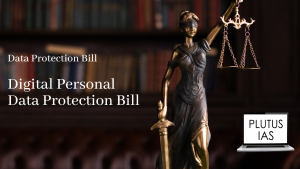24 Nov Analysis of the Digital Personal Data Protection Bill
Digital Personal Data Protection Bill
This article is based on the “Digital Personal Data Protection Bill“. It talks about the Political and Constitutional significance of Digital Personal Data Protection.
Relevance for Prelims: Definitions, Application of the Act, Digital Personal Data Protection Bill
Relevance for mains: Provisions related to Data Protection Bill, Cyber security, and Personal data protection.
News:
- A new version of the Personal Data Protection Bill, now known as the Digital Personal Data Protection Bill, 2022, has been released by the Union Government.
- This draft appears to be an effort to improve prior revisions after the government withdrew an earlier version by proposing to create a “comprehensive legal framework” on data protection and Internet governance.
- After the 2019 Personal Data Protection Bill was withdrawn, the bill was introduced three months later.
Changes to be introduced:
- Now, a notice is to be given for the data principal’s consent, and the fiduciaries should be able to remove any stored or intended for sharing with others such data if the consent is withdrawn.
- The new draft suggests the creation of a Data Protection Board of India, whose composition and strength, the selection procedure, etc. will be outlined by the Union government.
- The proposed board’s relationship with the Union government will not be sufficiently independent, which is a worry given that the state also collects a significant amount of personal data.
- The new draft proposes the establishment of a Data Protection Board of India, whose strength and composition, the process of selection, etc. will be prescribed by the Union government

Pic: Digital Personal Data Protection Bill
Limitations of the new data protection bill:
- Contrary to the 2018 version, the latest draft does not make reference to important data protection principles such as collection limitation, which requires data fiduciaries to only gather personal data that is necessary for processing.
- Additionally, it excludes obligations on data fiduciaries to reveal to principals information regarding beneficiaries of data sharing, the length of storage, etc. As a result, data principals are no longer fully protected, as seen by the absence of transparency on how data fiduciaries are using their personal data.
- For simplicity, there are just 30 clauses, however, this leaves some privacy safeguards’ details unclear.
Pros of the new data protection bill:
- An important provision on fiduciaries notifying principals and the data protection authority about data breaches in stored records is included in the agreement.
- The measure provides that people should be able to “access basic information” in the languages included in the Indian Constitution’s eighth schedule.
- The ability to request the deletion and updating of data gathered by the data fiduciary shall be granted to data principals.
The significance of the Digital Personal Data Protection Bill
- In contrast to the contentious necessity of local storage of data within India’s territory in the previous Bill, the new Bill allows major allowances for cross-border data transfers.
- It takes a comparatively accommodative stance on the need for data localization and allows data flow to a few worldwide locations, which is expected to encourage trade agreements between nations.
- The PDP Bill, 2019, did not recognize the data principal’s right to posthumous privacy (Withdraw Consent), which the current Bill does.
India’s trajectory on Personal Data Protection:
- Justice K. S. Puttaswamy (Retd) vs Union of India 2017: Justice K. S. Puttaswamy (Retd) v. Union of India, decided by a nine-judge Supreme Court panel in August 2017, established India’s basic right to privacy as an integral component of life and liberty under Article 21.
- B.N. Srikrishna Committee 2017: In August 2017, the government established an expert committee for data protection, which was headed by Justice B N Srikrishna. The group’s report and a draft data protection bill were both submitted in July 2018.
- The report makes numerous proposals for strengthening India’s privacy laws, including those for a Data Protection Authority, the right to be forgotten, data localization, and limitations on data processing and gathering
Information Technology (Intermediary Guidelines and Digital Media Ethics Code) Rules 2021:
- Social media sites are required to take greater care with the content they host.
Further Readings:
Information Technology Rules, 2021
Personal Data Protection Bill, 2019
Article 19 of the Indian constitution
Cyber security
Prelims Question:
Question: Under which Article is the Right to Privacy protected?
1. Article 21
2. Article 15
3. Article 24
4. Article 18
Mains Question:
Question: Examine the scope of fundamental rights in light of the most recent Supreme Court decision regarding the right to privacy.
Source: The Hindu
Download PDF:
The Digital Personal Data Protection Bill, 2022
Daily Current Affairs for UPSC
Get the latest Daily Current Affairs from Plutus IAS. For passing the UPSC examination, everyone should read Current Affairs every day. Without going through daily updated current affairs, No one can pass their mains, prelims, and interview examination. So for cracking the IAS examination, everybody should read current affairs daily.




No Comments